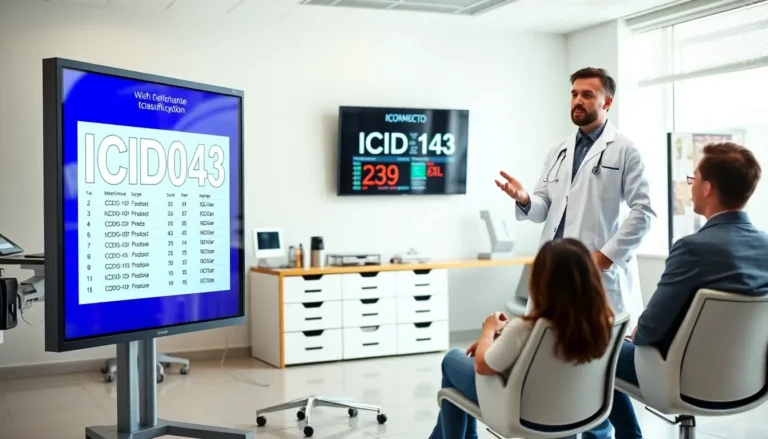Table of Contents
ToggleNavigating the wild world of relationships can feel like trying to assemble IKEA furniture without the instructions—frustrating and often confusing. Whether it’s the spark of a new romance or the challenges of a long-term commitment, everyone could use a little guidance. After all, love shouldn’t come with a manual, but sometimes it sure feels like it should!
Understanding Relationship Guidance
Navigating relationships presents unique challenges. Relationship guidance offers direction in understanding these complexities.
Definition of Relationship Guidance
Relationship guidance refers to advice and strategies aimed at improving interpersonal connections. It encompasses various aspects, including communication, conflict resolution, and emotional support. This guidance is helpful for couples at any stage, whether exploring new love or addressing long-standing issues. Trained professionals often provide this support, utilizing techniques such as counseling or workshops to assist individuals and partners. A focus on personal growth and mutual understanding defines effective relationship guidance.
Importance of Relationship Guidance
Relationship guidance plays a crucial role in fostering healthy relationships. It enhances communication skills, allowing partners to express feelings and needs openly. Guidance also aids in resolving conflicts, providing strategies to handle disagreements constructively. Understanding behavior patterns promotes awareness of personal and interpersonal dynamics, leading to stronger connections. Ultimately, seeking relationship guidance can prevent misunderstandings and cultivate long-lasting bonds, enriching both individual and shared experiences.
Common Relationship Issues

Many couples face common challenges that can hinder their connections. Addressing these issues early can lead to healthier relationships.
Communication Problems
Communication problems often arise when partners fail to express their needs clearly. Misunderstandings may occur due to assumptions, leading to frustration. Active listening can improve understanding, ensuring both partners feel heard. Nonverbal cues also play a significant role, with body language and facial expressions conveying emotions. Couples could benefit from setting aside time for open discussions. Prioritizing clarity in conversations can significantly enhance relationship stability.
Trust Issues
Trust issues frequently stem from past experiences or insecurities. One partner’s behavior may trigger doubts, creating a cycle of suspicion. Building trust requires transparency; sharing personal thoughts can foster a deeper connection. Apologies and accountability when mistakes occur help rebuild trust over time. Couples should establish boundaries that promote emotional safety. Prioritizing honesty can strengthen the foundation of any relationship.
Conflicting Priorities
Conflicting priorities can lead to resentment in relationships. Different career goals, family commitments, or personal interests may create distance. It’s crucial for partners to discuss their aspirations openly. Finding common ground can help align individual goals with shared ones. Regular check-ins can assist in recalibrating priorities as circumstances change. Prioritizing mutual support can strengthen the bond between partners, ensuring both feel valued.
Effective Strategies for Relationship Guidance
Effective strategies enhance relationship dynamics and facilitate deeper connections. Various techniques aid in improving communication, resolving conflicts, and fostering trust.
Active Listening Techniques
Active listening involves fully engaging with a partner during conversations. This technique requires focusing on what the other person says without interrupting. Paraphrasing statements helps confirm understanding and shows that listening occurs. Additionally, maintaining eye contact fosters connection and encourages openness. Validation of feelings reinforces that their emotions are acknowledged, promoting a safe space for sharing. Finally, asking open-ended questions can encourage deeper discussions and ensure both partners feel heard.
Conflict Resolution Methods
Conflict resolution methods empower couples to address disagreements constructively. Identifying the root cause of a conflict provides clarity and focuses discussions. Each partner should express their feelings honestly while avoiding blame. Utilizing “I” statements emphasizes personal experiences rather than placing accusation. Brainstorming solutions together fosters collaboration and builds mutual respect. Compromise plays a vital role in finding middle ground that satisfies both partners. Lastly, staying calm during discussions prevents escalation and ensures productive communication.
Building Trust and Intimacy
Building trust and intimacy forms the foundation of healthy relationships. Honesty must underpin all interactions; without it, trust erodes. Consistency in actions reinforces reliability and strengthens bonds. Sharing personal experiences creates vulnerability and allows partners to connect on a deeper level. Setting and respecting boundaries demonstrates respect for each other’s feelings and desires. Continuous efforts to express appreciation and acknowledge contributions deepen emotional connections. Regular quality time spent together enhances intimacy and fosters romance, reinforcing positive relationship dynamics.
Seeking Professional Help
Seeking professional help can enhance relationships in significant ways. Guidance from a trained therapist provides couples the tools needed to navigate challenges.
When to Consider Counseling
Counseling becomes beneficial when communication breaks down. Signs include repeated arguments, a lack of connection, or feelings of isolation. Conflicts that don’t resolve and increase tension also indicate a need for professional support. Partners may also seek assistance when making major life decisions, like marriage or parenthood. Notably, identifying these issues early can prevent long-term damage, allowing couples to rebuild their relationship.
Types of Relationship Therapy
Various types of relationship therapy exist to address diverse needs. Couples therapy focuses on improving communication and resolving conflicts between partners. Individual therapy allows one partner to explore personal issues impacting the relationship. Group therapy offers shared experiences with others, providing valuable insights and support. Additionally, online therapy may suit those preferring a flexible, remote option. Each type serves specific goals, creating possibilities for growth and understanding.
Navigating relationships can be challenging but with the right guidance, couples can cultivate deeper connections. Understanding communication styles and addressing trust issues are essential for maintaining a healthy partnership. By actively engaging in discussions and seeking professional support when needed, individuals can overcome obstacles that threaten their bond.
Embracing relationship guidance not only strengthens connections but also fosters personal growth. It’s important to remember that every relationship requires effort and understanding. With the right tools and strategies, couples can transform their experiences into enriching journeys filled with love and support.







